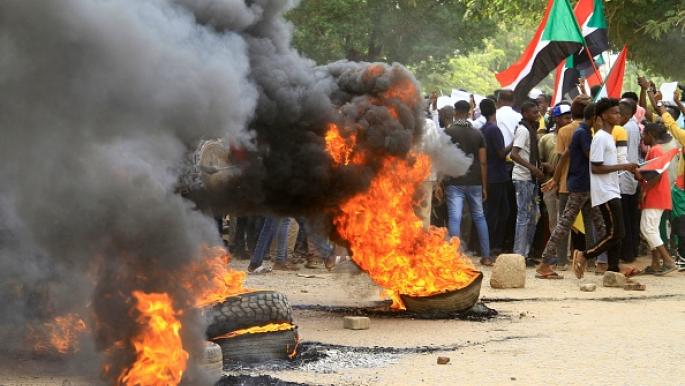and commemorate the anniversary of the Oct. 1964 Revolution
Al-Yure-(Agencies and local media) – Nearly a year after army chief Abdel Fattah al-Burhan turned on Sudan’s democratic transition, thousands of Sudanese demonstrated Friday in several parts of the country chanting slogans against “military rule” and a planned political settlement with coup leaders or their participation in governance. It also concided with two violent days in the southern Blue Nile state, following clashes between Hausa and rival tribes, which killed at least 150 people, including women, children and the elderly.
In Khartoum, thousands of demonstrators chanted, “The people want the fall of the regime.”
While In the city of Omdurman on the west bank of the Nile, where security forces fired tear gas canisters, protesters raised slogans of “military to the barracks” in reference to their demand for civilian rule. Protesters also chanted “No to tribalism” and “No to racism”, following two bloody days in the southern Blue Nile state.
Clashes have resumed between Hausa and the indigenous tribes living in this agricultural state bordering Ethiopia, killing 150 people, including women, children and the elderly, and injuring 86,” said Abbas Moussa, director of the hospital in the town of Wad al-Mahi, where the clashes took place.
“Anniversary of the October Revolution”
Demonstrations were also held in the city of Wad Madani (centre), al-Obeid (West) and in Kassala and East Nile states in the east.
In Khartoum, Badawi Ahmed said: “We don’t want a compromise and we don’t want a partnership with the army. “We are not here to fight the Generals, we want to topple them.” Demonstrators called for the “return of October” in 1964. That month, 58 years ago, Sudan witnessed a “revolution” that overthrew military rule.
It is an important history in Sudan, which has been ruled almost continuously by the military since independence.
In 2019, pro-democracy protesters thought they were repeating history and that they had gotten rid of Omar al-Bashir’s 30-year Islamist military rule and forced the military to share power with civilians. But on October 25, 2021, General Burhan led a coup d’état that put an end to their aspirations.
Since then, protesters have demonstrated almost every week and face police repression that has killed 117 people, according to the pro-democracy medical syndicate. They have already called for new demonstrations on 25 and 30 of this month.
A protester named Osman in Khartoum enthusiastically said: “All the people will demonstrate in all cities and the Burhan regime will definitely fall.”
Since the morning, police have been deployed in the capital Khartoum and at its bridges. The Resistance Committees, the neighborhood groups that organize anti-coup movements, have been calling for demonstrations on social media for days. In anticipation of new casualties, the U.S. embassy in Khartoum on Thursday called on security forces to “exercise restraint” in a statement posted on Twitter.
Just a year ago, demonstrations marked the 1964 October Revolution, in which thousands of Sudanese across the country took part in a test of strength by supporters of civilian rule against the army that four days later carried out its coup.
Security vacuum
The security vacuum created by the coup, especially after the termination of the mission of the United Nations peacekeeping force in the region following the signing of a peace agreement between armed factions and the central government in 2020, led to the return of tribal conflicts over land, water and pasture.
The governor of Sudan’s southern Blue Nile state declared a state of emergency on Friday and gave security forces full powers to “stop” tribal fighting that has killed 150 people in two days.
A decree issued by Ahmed Mayor Badi said he was “declaring a state of emergency throughout the Blue Nile region for thirty days”. Local officials also tasked the police, army, and intelligence services, as well as the RSF, with “intervening with all available means to stop tribal fighting.”
Since Monday, authorities have imposed a nightly curfew after 13 people were killed, according to the United Nations, in clashes between members of the Hausa tribe and rival tribes. But clashes have renewed despite the security deployment.
Hundreds of people demonstrated Thursday in Damazin, the capital of Blue Nile state, to protest the violence, and other demonstrators demanded the departure of Governor Badi, saying he was unable to protect the population.
At the beginning of the violence, members of the Hausa tribe across Sudan protested against what they saw as discrimination against them because of tribal custom prohibiting them from owning land in Blue Nile because they were the last tribes to settle in the state.
Land use is a highly sensitive issue in Sudan, one of the world’s poorest countries, where agriculture and livestock account for 43 percent of jobs and 30 percent of GDP.
Last week, 19 people were killed and 34 wounded in a tribal conflict in West Kordofan state (south), according to UN data. Since January, some 550 people have been killed and more than 210,000 displaced by tribal conflicts in Sudan, according to the same source.


